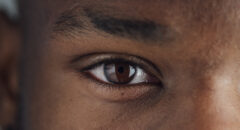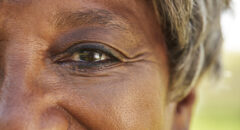
When former Spice Girl Mel B revealed that she was temporarily blinded in one eye due to a herpes-related complication, it shocked many fans and sparked a wave of questions about the virus’s potential dangers. Like, how can having sex make you blind, right?
While herpes is often associated only with cold sores or genital outbreaks, few realize that it can, in rare but serious cases, affect the eyes and even lead to vision loss. Mel B’s experience shines a light on a lesser-known aspect of the virus, underscoring why understanding its risks—and how to protect yourself—is more important than ever.
Ocular herpes is when herpes viruses affect your eyes. It’s a serious and often severe condition that can cause blindness, so it needs quick diagnosis and treatment. It’s sometimes known as “herpetic eye disease” or, informally, “eye herpes.”
There are two main viruses that cause this condition:
Herpes simplex virus (HSV): Two strains of HSV can cause ocular herpes. Those are HSV type 1 (HSV-1), better known as “oral herpes,” and HSV type 2 (HSV-2), better known as “genital herpes.” HSV-1 causes most eye herpes cases in the U.S. When HSV affects your eyes, it’s known as herpes simplex ophthalmicus (HSO).
Varicella zoster virus: This virus causes chickenpox, and later in life it can reactivate and cause shingles. If shingles spreads to your eyes, it’s known as herpes zoster ophthalmicus (HZO).
How common is it?
About 500,000 people in the U.S. have HSV-related eye herpes, with about 58,000 cases diagnosed per year. It can affect people of any age. Because HSV is very common, many more people are at risk. Research indicates that among people in the U.S. ages 15 to 49, around 50% have HSV-1 (either active or inactive), and about 12% have HSV-2.
Varicella zoster virus affects about 1 in 1,000 people in the U.S. each year, and that number climbs to around 1 in 100 people older than 60. Experts estimate that between 8% and 20% of these cases cause eye-related symptoms and issues. Cases in children are rare.
Let’s talk about HSV-1…
HSV (Herpes Simplex Virus) keratitis is an infection of the cornea (the clear dome that covers the colored part of the eye) that is caused by HSV. The infection usually heals without damaging the eye, but more severe infections can lead to scarring of the cornea or blindness. HSV keratitis is a major cause of blindness worldwide.
HSV is only found in humans and is spread through direct contact with someone who is infected with the virus. Most HSV keratitis infections happen after another part of the body—most commonly the mouth—has already been infected by HSV. HSV keratitis is often the result of a “flare up” (reactivation) of the earlier infection.
Symptoms
Symptoms of HSV keratitis include:
- Eye pain
- Eye redness
- Blurred vision
- Sensitivity to light
- Watery discharge
If you experience any of these symptoms, remove your contact lenses (if you wear them) and call your eye doctor immediately.
Prevention methods
HSV keratitis can lead to vision loss or blindness if left untreated. Maintain eye health while wearing contact lenses through proper daily habits and regular consultation with an eye doctor.
Wash hands thoroughly before touching eyes, especially with cold sores or herpes blisters
Only use prescribed or recommended eye drops by an eye doctor or health care provider
HSV keratitis is usually diagnosed based on a patient’s health history and eye exam results. Lab testing is not usually necessary, but certain lab tests may further help to confirm HSV-1.
HSV keratitis treatment usually involves medicine, including eye drops or antiviral medications taken by mouth. Surgery is rarely necessary but may be considered if scarring on the eye from HSV keratitis causes vision problems. Each case of HSV keratitis is unique, and an eye doctor should determine the best treatment for each patient. While some treatments can greatly lower the severity and recurrence of symptoms, there is no cure for HSV.

Understanding your risk
People who have had HSV keratitis are at risk for recurrences of the same infection. For these people, wearing contact lenses may further increase the risk.
People most at risk for HSV-1 (but not necessarily HSV keratitis) are:
- Female
- Non-Hispanic black or Mexican American
- Born outside the United States
- Sexually active, or have had 3 or more lifetime sex partners
Black Women seem to be at a higher risk
African American women experience significantly higher rates of genital herpes (HSV-2) compared to other ethnic and racial groups. Research indicates that nearly one in two African American women between the ages of 14 and 49 have HSV-2, according to the CDC. This higher prevalence is a serious public health concern, with potential implications for sexual and reproductive health.









